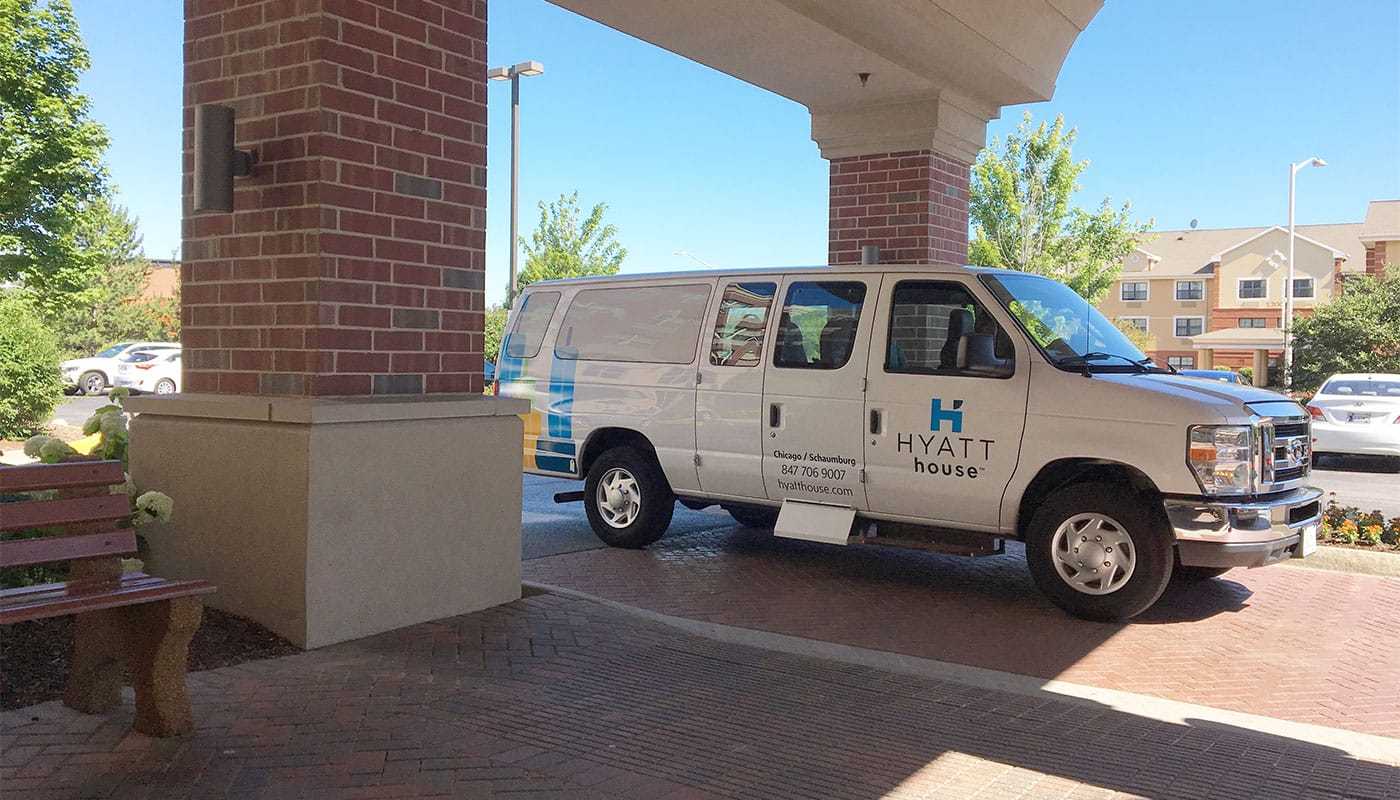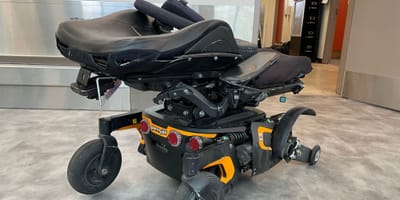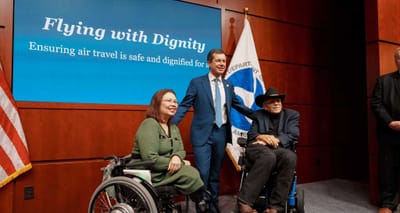Note: This article was first published on October 2, 2016, and has been updated with additional information from my experiences since that date.
Traveling with a wheelchair for about four years now, I have stayed at quite a few hotels that offer guests complimentary shuttle service to nearby airports, attractions, convention centers and local points of interest. The Americans with Disabilities Act requires such shuttles to be wheelchair accessible or, in limited circumstances, permits hotels to contract an accessible alternative.
Sadly, the majority of hotels do not offer ADA-compliant shuttles or a wheelchair accessible alternative that meets the appropriate standard. When I first started traveling with a disability, I took these inconveniences in stride and paid the taxi or city bus fare out of my own pocket. I was averse to conflict and didn’t want to appear a burden. Now, as I advocate for accessible travel through this website, I can no longer turn a blind eye to disability rights violations.
The ADA is clear: Hotel shuttles MUST be accessible.
The ADA describes accessibility requirements for hotel and other courtesy shuttles in great detail. The United States Department of Justice has created a detailed guide to assist businesses in complying with the ADA. Lesson 7 of the guide addresses transportation services offered as a convenience to customers. I’ve quoted two relevant sections below, which make it clear that customers with disabilities cannot be left behind:
Some businesses provide transportation for their customers as a convenience that supports their primary business. Examples include hotels that provide courtesy shuttle vans for guests going to or from an airport or other local destinations…Companies that provide services like these must offer transportation to people with disabilities.
Companies that provide transportation services on demand (such as a hotel that sends a van to an airport to pick up a customer when the customer calls the hotel) can acquire vehicles that are equipped with a lift or can contract with another company to provide accessible service for the customers who need it.
In short, if a hotel offers a shuttle service – it must be accessible, or (in limited/specific circumstances) the hotel must have a plan to provide an alternate accommodation. This comes straight from the DOJ.
The ADA requires “equivalent service”
If a hotel chooses not to purchase an accessible shuttle of their own, the alternative contracted service must be “equivalent.” The DOJ’s ADA compliance guide states:
The important thing to remember is that the service provided must be equivalent. If customers without disabilities can get transportation quickly and easily, people with disabilities deserve equivalent service. The services offered to people with disabilities must be as convenient as the services offered to other people in terms of fares, schedules or response times, hours of operation, pick-up and drop-off locations, and other measures of equivalent service.
This “equivalent service” rule is critically important, since most hotels choose to contract accessible transportation rather than purchase an accessible vehicle of their own.
The DOJ warns that, if a hotel chooses to contract accessible transportation for wheelchair users, it “must be as convenient as the services offered to other people,” a requirement that applies to response/wait times, service areas and schedules, etc.
A difference of 5 or 10 minutes in response time… who cares? But an hour? That’s not okay.
Some hotels may attempt to defend discriminatory practices by saying they could have accommodated you, but only if you had provided advance notice. Yet, requirements for advance notice deny the precise benefits of an “on-demand” shuttle service. Ultimately, an advance notice requirement imposed on guests needing accessible transportation is only permissible if that same condition is imposed on other (able-bodied) guests.
Hotels offering a regularly scheduled, fixed route shuttle service must provide accessible vehicles of their own. These hotels (where shuttles run continuously and guests do not have to call for pick-up) may not contract an alternative service for guests with disabilities; the standard service must be accessible.
4 Examples of ADA non-compliance with Hotel Shuttles
Here, I would like to share five personal experiences that reflect the ways in which travelers with disabilities experience shuttle-related ADA violations. Each of the hotels mentioned below offer a complimentary shuttle service to guests, which I planned to make use of. I faced a different issue (or response to ADA noncompliance) at each hotel. I share this here not to complain or to retaliate, but to expose the accessibility barriers and discriminatory perspectives that must be dismantled.
ATLANTA – Accessible, but not equivalent.
The Courtyard Marriott Atlanta Airport North offers an accessible shuttle, but only one of the two shuttle buses are accessible. After arriving at the airport, I waited nearly 45 minutes for the shuttle to pick me up. Able-bodied guests were able to board the standard shuttle within about 20 minutes.
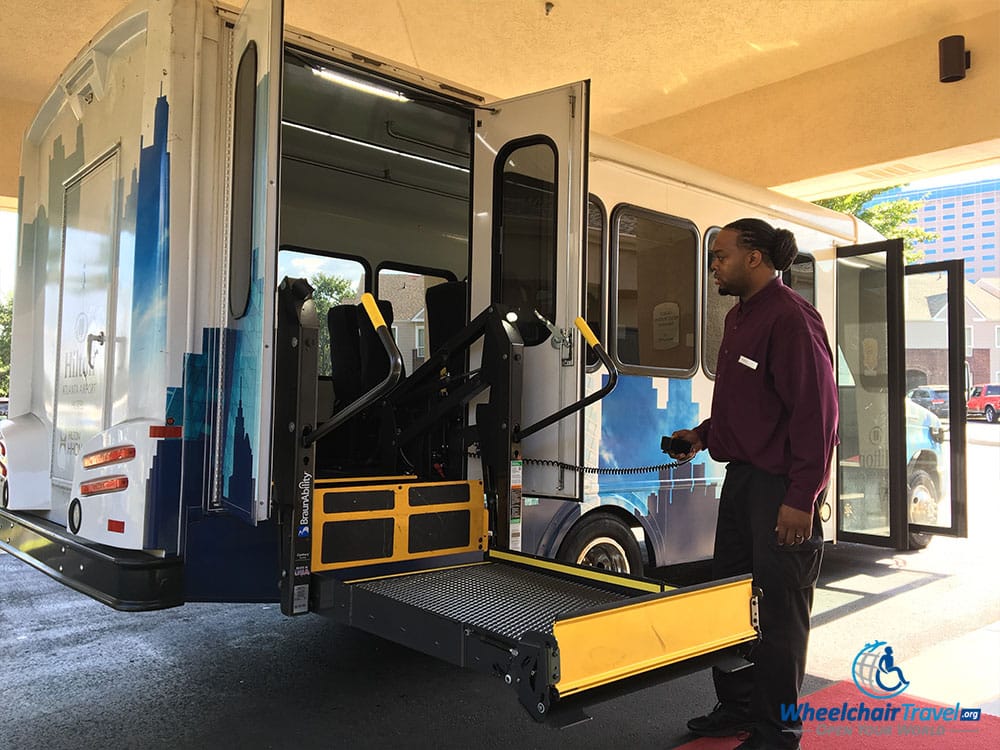
The next day, I requested a ride back to the airport at 3:00 p.m. Nearly an hour later, I was told that the keys to the accessible shuttle bus had been “misplaced.” The non-ADA shuttle made several trips between the hotel and airport before I could be accommodated using another hotel’s shuttle (thank you, Hilton Atlanta Airport!).
In total, I was delayed by more than an hour – it’s a good thing I was leaving early for my flight. Although I was ultimately accommodated, I didn’t receive the same service as able-bodied customers. According to the ADA, this was a violation of my right to equal access.
ALBUQUERQUE – Rolling to/from the airport.
On my very first trip to Albuquerque, New Mexico, I split time between two hotels. One was downtown, the other by the airport. The Hyatt Place Albuquerque Airport offers complimentary shuttle service to/from the airport and restaurants/businesses near the hotel. The shuttle is not accessible, and no equivalent service is available.
The hotel is about 1.5 miles drive/walk/roll from the airport (or “sunport,” as they call it). A city bus departs hourly from the Albuquerque Airport, but will only shave half a mile off the total walking distance.
As such, I chose to roll the entire distance in my wheelchair. If I were a manual wheelchair user, this would not have been possible due to significant elevation changes along the route. A portion of that final mile between the city bus stop and hotel does not have a sidewalk, so I had to roll in the street for a short distance.
With no other hotels having a wheelchair accessible shuttle and no wheelchair taxis being available in the city, there was no solution available in the time that I was there. Tough city, Albuquerque, but the city bus is great for trips downtown.
DALLAS – “Advanced notice [24 hours] is required.”
After just coming off a flight from Madrid, Spain, I learned that I would not be able to make it to Florida (my final destination) without waiting nearly 5 hours at DFW airport. Exhausted and sore from the 10-hour flight, I decided to book a hotel and relax in bed. I chose the Four Points by Sheraton Dallas Fort Worth Airport North.
After making it to the curb, I called the hotel to request shuttle pick-up. I notified the agent that I am a wheelchair user who needs an accessible shuttle with a ramp or lift. After putting me on hold to verify the shuttle’s accessibility, she returned with good news. The wheelchair accessible shuttle would arrive within 20 minutes.
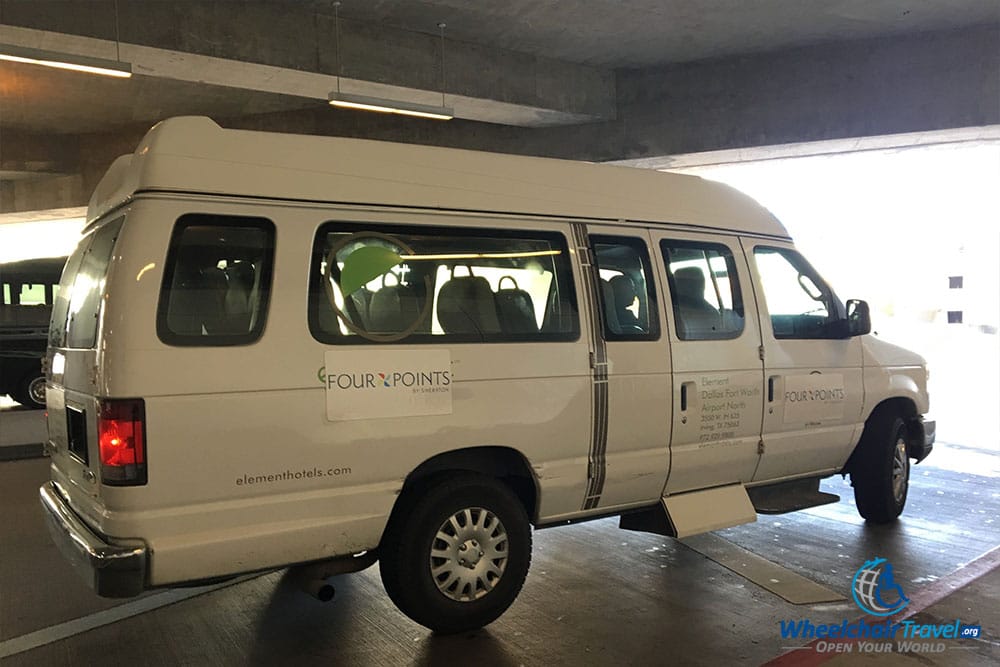
Unfortunately, the shuttle was not accessible. The driver, a very friendly guy, offered to lift my wheelchair into the shuttle van. Considering it weighs 400-lbs., that was not a feasible solution. I called the hotel back and asked for the accessible service they would have been required to contract. “Get a taxi” from the airport, she said. Well, what wheelchair taxis in Dallas? With no other choice, I gave up, canceled the reservation and searched for another hotel.
What really frustrated me were the contents of an e-mail from the hotel’s General Manager, followed by a subsequent phone call some weeks later.
“Our hotel is in compliance with all ADA laws however we are not required to have a shuttle van with ADA lifts.” OK, that’s true , but only if you can provide an equivalent service through a contractor. “There are private shuttles that do have lifts, however advanced notice is required for us to make the necessary arrangements and to my knowledge no advanced request or notice had been communicated to us.” I replied back, asking what amount of advance notice he considered reasonable for an on-demand airport (and local area) shuttle service. The answer? 24 hours.
The GM said some really discriminatory things, and even used the past version of this article to conclude that I had “singled out” his hotel, somehow knowing that their shuttle would not be accessible. But, apart from the Hyatt Regency DFW (which does have an accessible shuttle), I had never stayed at another airport hotel in Dallas. I hadn’t had a need to. What I did was narrow down the available choices for a last-minute hotel stay to the one that met my needs for location and price. Isn’t that what every consumer does in a free market, disabled or not?
Long story short, the hotel committed a serious ADA violation, is guilty of disability discrimination, and I hope Starwood Hotels (now Marriott) corporate will address the issue (and make the hotel buy an ADA shuttle).
MIAMI – An alternate arrangement that failed.
Due to a weather diversion and delayed arrival to the Miami Airport, I missed my connecting flight to Quito, Ecuador and was stuck. After booking a room at the Hyatt Place Miami Airport East using the Hyatt mobile app, I called the hotel to request the shuttle.
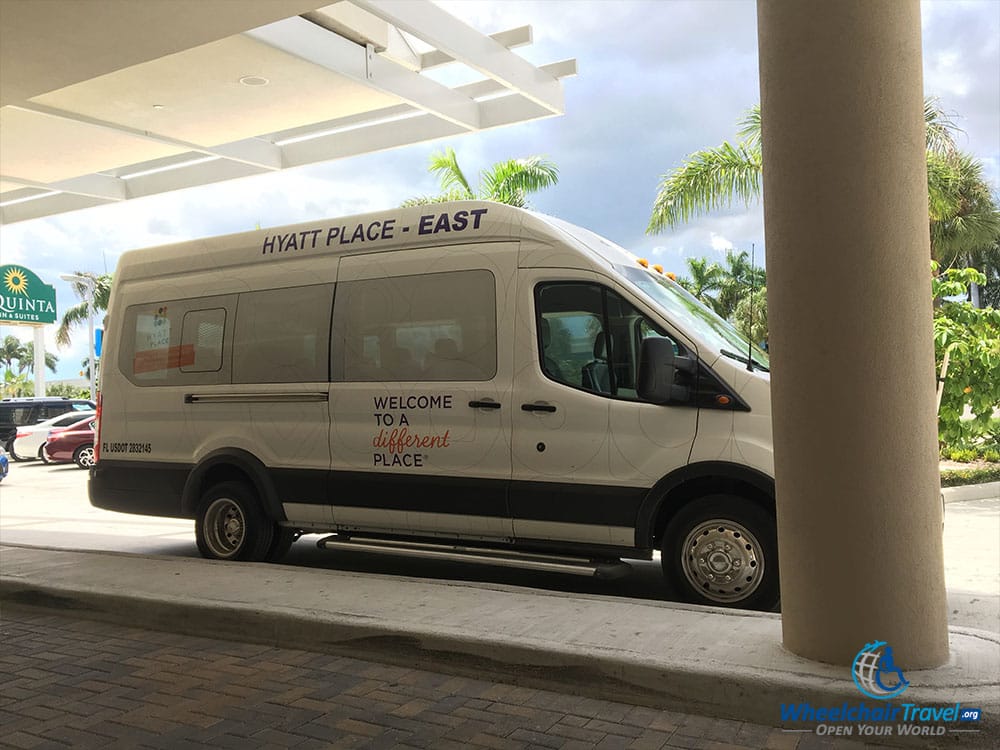
I was informed that hotel’s own shuttle was not accessible, but the Embassy Suites (located next door) would give me a lift. An hour later, it hadn’t arrived. It being late in the evening, I decided to hail an accessible taxi – another feat altogether. I didn’t get to the Hyatt Place until more than two hours after I first called for the shuttle. To add insult to injury, I was out $20 for a taxi… to go 1.5 miles.
The next day, I needed a ride back to the airport, so I asked my hotel to arrange the Embassy Suites shuttle. Embassy Suites refused, saying they were not allowed to pick up guests from another hotel. Weird, I thought.
I spent the next half hour rolling to the airport on my own – all to save $20 on a return taxi.
The hotel didn’t have an accessible shuttle, and it clearly had no plan to accommodate me otherwise. Because I wasn’t accommodated, the hotel violated its requirement to provide equivalent services to guests with disabilities.
5 Examples of hotels following the law (and doing the right thing)
Since my descriptions of the offending hotels were so lengthy, I’ll shorten these examples into bullet points.
- Park Hyatt New York — This hotel in Midtown Manhattan provides complimentary sedan service to destinations within a limited radius of the hotel. They are able to provide a reasonably equivalent accessible service with the readily available wheelchair taxis in New York.
- Renaissance St. Louis Airport Hotel — Provides its own wheelchair accessible airport shuttle in a city where an alternative would not be equivalent.
- The Westin San Francisco Airport Hotel — Provides multiple airport shuttle buses that are accessible with heavy-duty wheelchair lifts.
- Madrid Marriott Auditorium Hotel & Conference Center — This hotel in Madrid, Spain obviously isn’t subject to the ADA, but I use it as an example to show the importance of accommodating every guest. The hotel provides an accessible low floor shuttle van (with wheelchair ramp) to guests for airport transfers. Bravo!
- AC Hotel Chicago Downtown — In a city where an accessible equivalent might not be reliably available, this hotel does not provide shuttle service to any guests. This is a choice available to every hotel, general manager or ownership group to guarantee ADA compliance. If you can’t (or won’t) offer an equal service to every guest, don’t offer it at all.
A free shuttle (that is accessible) really improves the experience of travelers with disabilities, and I am happy when a hotel elects to provide one.
So, what can you do?
When your ADA rights are violated, you’re left with only a few options. You could file suit in a court of law, but that’s time-consuming and costly.
I recommend that you reach out to the hotel or business directly. In person and during your stay is best. Ask them to make you whole, and also to provide a timeline for achieving ADA compliance.
If you have incurred expenses as a result of a shuttle not being accessible (such as a taxi fare), provide a copy of the receipt and request reimbursement. You are entitled to this by law.
If the service provided was not equivalent to that offered to other guests and you are unable to speak to a manager during your stay (or choose not to), send an e-mail to corporate customer care. Explain the issue, do your best to describe the ADA violation that occurred, and make it clear that you view the situation as discriminatory.
Maybe they’ll offer you something, maybe they won’t. If for some reason you are not satisfied with their reply, or the hotel refutes your claim that a violation occurred, please file a complaint with the Department of Justice. This is a painless process that takes only a few minutes, and could help the DOJ in building a civil rights case.
Sometimes, hotel management is simply unaware that a problem exists. Rather than going to war, I would prefer to work toward solutions that will benefit others in the future. The pursuit of civil rights is never easy and results are never instant, but we must join together to create the accessible world of tomorrow.

